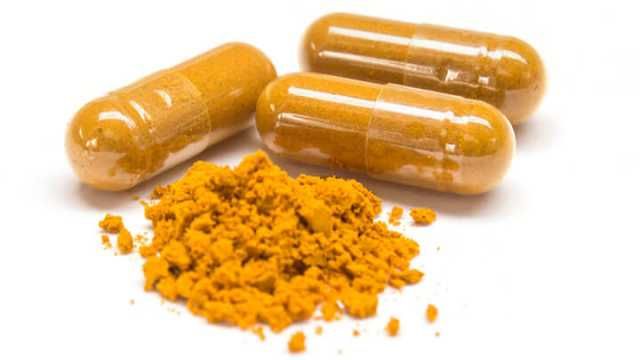
Knee pain is not uncommon these days. And for many of us, it’s very frustrating, as it can limit our mobility and thereby limit the experiences we’re able to enjoy. Often, we turn to nonsteroidal anti-inflammatory drugs (NSAIDs) or other pharmaceutical painkillers to reduce knee pain. It’s important to know, however, that painkillers — even the ones that we can purchase easily at the drugstore — aren’t always completely benign.
For example, a Lancet review deemed ibuprofen, as the banned drug Vioxx, toxic to the heart. And if you take a NSAID, you may be up to three times more likely to develop gastrointestinal side effects. But there are natural alternatives. One of the most effective is turmeric.
Turmeric is a culinary spice often used in Indian cooking. It contains curcumin, a polyphenol that gives turmeric its golden color. It is believed to have hundreds of health benefits.
Turmeric vs. ibuprofen for knee pain

One study specifically examined the efficacy of turmeric as compared to ibuprofen in treating knee pain. The study included 109 participants who all had primary knee osteoarthritis. The participants were split into two groups, one of which received ibuprofen and the other turmeric, every day for six weeks. The researchers measured the patients’ pain levels while walking on level ground and up and down stairs.
At the end of six weeks, both groups demonstrated improvements, though the participants in the turmeric group reported less pain on the stairs. They also performed better while walking. The patients also reported a higher rate of satisfaction with their treatment and experienced fewer negative effects.
Arthritis

If your knee pain is the result of arthritis, turmeric can be quite helpful. It contains over two dozen anti-inflammatory compounds, including COX-2 inhibitors. COX-2 is an enzyme that can lead to lead to pain, swelling, and inflammation. Inhibitors, of course, prevent those symptoms. Curcumin is one of these compounds, and on its own, it has been shown to be highly effective at reducing inflammation.
Its anti-inflammatory properties have other benefits, as well. For example, turmeric can help to reduce micro-inflammation in the GI tract that’s often linked to inflammatory bowel disease. In addition, it is thought that turmeric can be beneficial for athletes who are experiencing joint pain as a result of their training routines. It can help to reduce the inflammation associated with this kind of pain.
Meriva
An Italian study examining the efficacy of a patented extract of turmeric, called Meriva, found it to be effective at treating osteoarthritis. The researchers selected a group of 50 participants, all of whom had osteoarthritis in one or both knees. The participants were divided into two groups. The first received standard treatment determined by their doctors, and the second received the standard treatment, as well as Meriva.
After 90 days, the group taking Meriva experienced a significantly larger decrease in overall pain, stiffness and physical functionality. In patients who were known to have elevated levels of the inflammation marker C-reactive protein, a 16-fold decrease of the protein was found. In addition, Meriva did not appear to cause any adverse side effects. Many medical professionals attribute these results largely to the benefits of curcumin. One could therefore assume that it is not necessary to take the patented product, as turmeric in any form will probably lead to similar results.
Solid gold
One review was bold enough to refer to curcumin as “the Indian solid gold” because if its efficacy in treating such a wide range of health conditions. Here are a few of the ailments that curcumin can treat:
- Arthritis
- Diabetes
- Alzheimer’s disease
- Inflammation
- Gastrointestinal distress
- Tumor growth
Turmeric or curcumin?
So you may be wondering — if many of the health benefits of turmeric come from curcumin, why not just supplement with curcumin? That is certainly one option, and will likely benefit your overall wellness. However, many natural health practitioners recommend supplementing with whole turmeric for a number of reasons. Most importantly, turmeric contains a number of compounds that will benefit your health. And while curcumin may potentially be the most potent, it is not the only one.
Also, oftentimes whole foods contain compounds that work together in subtle and nuanced ways to benefit your health. You won’t enjoy those benefits if you isolate just one of those compounds.
How to take it
If you decide to supplement with whole turmeric, you have a couple of options. You can take capsules or tablets of 400 to 600 milligrams three times daily, or as the bottle recommends. Before beginning this practice, it is very important to consult a medical professional to be sure it is a good option for you.
There are others who recommend making a paste using turmeric powder. For paste recipes, a quick internet search will give you various options. If you choose this option, apply the paste to the knee, wrap it in plastic wrap,and let it sit for 20 to 30 minutes.
Others suggest putting a tablespoon of turmeric into a quart of boiling water, then boiling it for 10 minutes and drinking it once it cools down. This improves the absorption of the turmeric in your body.
Clearly, there are a number of reasons why you may want to try turmeric if you’re experiencing knee pain. Luckily, there is no shortage of research supporting the efficacy of turmeric when it comes to reducing pain and inflammation. And there are animal studies suggesting it may be effective at treating rheumatoid arthritis, as well.
Still, it’s important to note that you may not want to take turmeric regularly if you have gallstones or bile duct dysfunction. And there are rare cases where using it over a long period of time has led to heartburn or stomach upset. As always, consult your physician before implementing any treatment plan, especially if you’re pregnant.
Discover 3 more benefits when you Combine Turmeric with Pineapple =>
— Sarah Cooke

